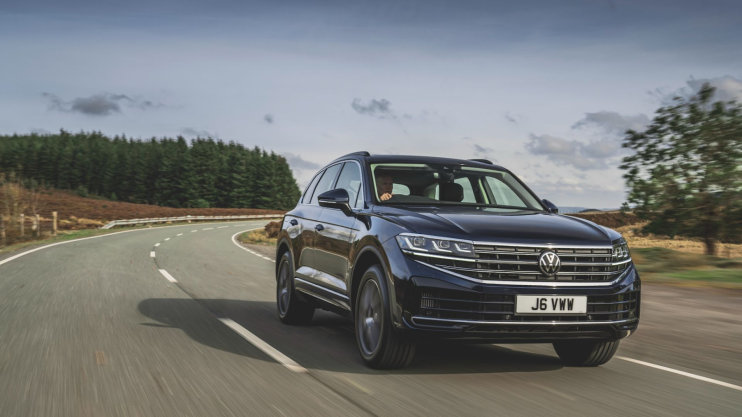Volkswagen Touareg eHybrid review: Power to the people

The literal translation of ‘Volkswagen’ is ‘people’s car’, but there is nothing proletarian about a price tag from £68,065. This puts the Touareg up against some decidedly premium competition, including the Audi Q7, BMW X5 and Mercedes-Benz GLE.
It isn’t the first time Volkswagen has ventured upmarket, of course. In the late 1990s, then-CEO Ferdinand Piëch tasked his engineers with building the best car in the world – one with a “cabin able to maintain 22 degrees in 50 degree outside temperatures, while being driven all day at 300kph”. Launched in 2002, the Phaeton was Wolfsburg’s answer to the Mercedes-Benz S-Class: a luxurious saloon as technically impressive as it was instantly forgettable.
That same year, Volkswagen also unveiled the first-generation Touareg. A full-size SUV available with monstrous W12 petrol and V10 diesel engines, it too pushed the brand into new, more exalted territory – but with far more success. Today, the Touareg is the established flagship of the VW range and well into its third generation.
Designer genes
In fact, the current Touareg recently underwent a facelift, with new bumpers, updated interior tech and – on some versions – a light-up VW logo on the tailgate.
We’ll get to the subjective stuff, but let’s run through the basics first. The Touareg comes with five powertrain options, all based around a 3.0-litre V6 engine. There are 231hp and 286hp diesels, a 340hp petrol and two plug-in hybrids: 381hp and the range-topping 462hp Touareg R.
Our test car was the 381hp eHybrid, which only comes in entry-level Elegance spec and is priced at £69,150. If that still sounds steep, bear in mind that the Touareg shares its aluminium-intensive ‘MLB Evo’ platform with the Audi Q7, Porsche Cayenne, Bentley Bentayga and Lamborghini Urus. Those are strong genes for a family SUV.
eHybrid machine
On the outside, the Touareg is less ostentatious than some rivals, particularly on modest (for a large SUV) 20-inch wheels. Under-the-radar or simply underwhelming? Your call on that one.
Standard equipment on the Elegance includes a panoramic sunroof, powered tailgate, reversing camera, heated front seats and adaptive LED matrix headlights. Alternatively, (non-hybrid only) Black Edition models gain 21-inch black alloys, air suspension and sportier styling, while the Touareg R rolls on 22s, with plenty of bright blue trim.
Step aboard (it’s quite a climb) and the Touareg feels edgier and more interesting. Its ‘Innovision Cockpit’ dashboard consists of two large screens – 12-inch for the digital dials and a 15-inch touchscreen – that join together to create a huge, glossy display. It certainly looks smart and there’s no shortage of interior space, plus a very practical 665-litre boot (810 litres in non-hybrid versions). Unlike the Audi Q7, though, you can’t opt for seven seats.
Plush and practical
Lesser Volkswagens, including the Golf and electric ID models, have been rightly lambasted for their clunky, unintuitive media systems. The Touareg is much better. Its screen looks sharp and is quick to react, voice control works well and the large icons mean you don’t end up cursing the lack of physical buttons. All VW needs to do now is ditch the fiddly haptic touchpads on the steering wheel…
Getting comfortable is easy and, as you’d expect, the Touareg’s high driving position and sheer size inspire confidence. Three adults can sit in comfort across the back bench, while folding the seats down creates a box big enough for even the most ambitious trip to Ikea.
The recent facelift has introduced more soft-touch materials and quality feels on par with premium-badged alternatives, even if the VW roundel doesn’t have the same prestige (Ferdinand Piëch would doubtless have disagreed).
Taking it easy
In official tests, the eHybrid returns 128mpg and CO2 emissions of 51g/km. Such numbers are slightly fantastical in the real world – they rely on fully charging your car before every (short) journey – and regular motorway drivers might see better economy from the diesels, which both average 34.4mpg. For anyone paying company car tax, though, the hybrid is a no-brainer.
The Toureg isn’t that most modern of oxymorons, a sporty SUV, and it’s all the better for that. Instead, it majors on calm, easygoing comfort. The light steering lacks feel and the ride on standard steel springs felt slightly firm over low-speed holes and humps (we’re told the optional air suspension improves matters). Still, the VW comports itself well for a 2,443kg SUV, dispatching long distances with minimal fuss.
One place we didn’t venture during a week with the Touareg was off-road. However, standard four-wheel drive, a choice of traction modes and a wading depth of up to 580mm should ensure it keeps going where more fashionable SUVs might flounder.
A people pleaser
Coming back to where we started, there’s no getting away from the Touareg’s price. For £70,000, or the equivalent in monthly finance payments, many people will prefer the image of an Audi Q7, or perhaps the sharper dynamics of a BMW X5.
Look beyond the badge, though, and there’s a lot to like. The VW is classy, comfortable and packed with tech. It’s a one-size-fits-all vehicle for any children, dogs or flat-pack wardrobe you throw at it, taking the stress out of family travels. Whether you’re on the school run or loaded up for a summer holiday, that feels like a genuine luxury.
A luxury car or a people’s car, then? In truth, the Touareg is a bit of both. It’s certainly worth considering if you’re in the market for a large SUV.
Tim Pitt writes for Motoring Research
PRICE: £69,150
POWER: 381hp
0-62MPH: 5.9sec
TOP SPEED: 155mph
FUEL ECONOMY: 128mpg
CO2 EMISSIONS: 51g/km